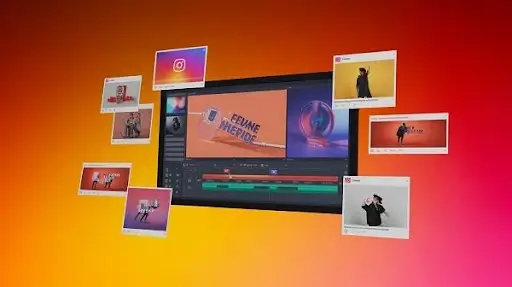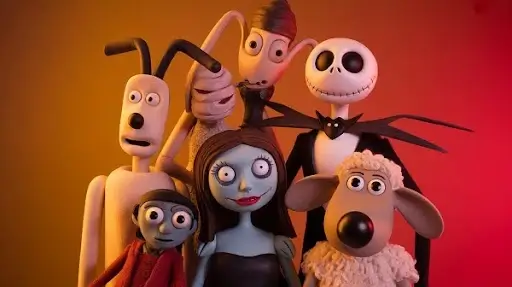A single animated video today can outperform 50 sales calls, 20 static ads, and a long landing page combined. Not because people love cartoons more, but because animation explains faster, sells faster, and sticks longer in the brain.
Brands are no longer asking if animation works. They are asking which type, for which audience, at what scale, and how soon it can ship.
That shift alone explains why the animation industry statistics are climbing at numbers that would make most tech sectors jealous. And here’s the twist: The biggest growth is not just in movies. It’s in businesses, healthcare, finance, manufacturing, education, SaaS, retail, any sector that needs to explain, retain, and convert better.
This deep breakdown isn’t built to sound fancy. It’s built to tell you what’s happening, what’s growing, and what your brand can’t ignore in 2025. So here it is. No fluff. No filler. Just the numbers and the story they tell.
Global Animation Industry Statistics Shaping 2025
The animation industry statistics show one undeniable reality: This is no longer an entertainment niche. It’s a global business asset.
The animation services industry statistics estimate the market will cross $400 billion by the end of 2025. Yes. With a B.
To put that in perspective: That’s larger than the global music industry and the global e-learning industry combined.
Growth isn’t slowing. The industry has been climbing steadily since 2018, when it sat at $250 billion. By 2021 it had jumped to $372.4 billion. That is not a gradual rise. That is demand stacking on demand.
A huge chunk of this growth comes from non-entertainment sectors. Companies are now using:
- 2D animation services for explainer videos
- 3D animation studio teams for product demos
- industrial animation services for training and safety modules
- VFX and animation industry statistics in marketing campaigns
- 3D animation pipeline methods to scale content fast
Animation is no longer a luxury. It’s a production engine.
Animation Sector Growth Statistics by Major Regions
North America leads by revenue, adoption, and job demand
North America continues to dominate the animation industry insights charts.
- Market value in 2023: $23.22 billion
- Expected by 2031: $36.73 billion
- Growth rate (CAGR 2024–2031): 5.90%
- Workforce size: 220,000+ animation professionals
- Job growth forecast till 2032: 8%
Studios, agencies, independent creators, software companies, and in-house production teams are all hiring. More demand also means more high-ticket contracts for 3D animation studio providers who can deliver at scale.
Asia Pacific is the fastest rising segment
This region isn’t just growing. It’s accelerating.
- Japan leads Asia’s animation market at $18 billion
- India’s VFX and 3D animation growth rate: 15% annually
- China jumped from $20B in 2018 to $34B+ in 2023
- Projected China industry value in 2025: $41.2B
Asia is not only producing content, it is exporting it aggressively to North America, Europe, and the Middle East.
Europe moves steady, exports strong
- EU animation industry value: $5 billion+
- Yearly export revenue: $2 billion+
- Growing demand for 2D animation, gaming cinematics, and branding content
Canada, South Korea, and Latin America show double-digit rise
| Region | Current Value | Expected Growth |
| Canada | $1B+ | 10% next year |
| South Korea | $1B+ exports | 20% yearly growth |
| Latin America | $500M+ | 10–15% growth yearly |
Every region tells the same story: More buyers. Bigger budgets. Shorter delivery timelines. More animation studios scaling their pipelines.
3D Animation & Computer-Generated Animation Market Share Statistics
85% of animation is now computer-generated
The computer-generated animation market share statistics show a massive shift. In 2022, 85% of global animation production was CGI-based. Only 15% belonged to traditional 2D or hybrid formats. This does NOT mean 2D is dying.
It means 2D has moved into:
- Explainers
- Brand videos
- Education tech
- Mobile ads
- UI/UX animations
- App onboarding
- Corporate storytelling
Meanwhile 3D animation leads in:
- Product showcases
- Medical animations
- SaaS tool demos
- Industrial training
- Architectural visualizations
- Gaming, AR, VR
- Automotive tech films
3D animation market doubling by 2028
The 3D animation industry forecast predicts:
- Market size to reach $40 billion by 2028
- 11.7% CAGR growth
- More investment in real-time rendering
- Higher demand for Unreal Engine artists
- Shorter 3D production cycles compared to 5 years ago
What used to take 4–6 months now gets produced in 6–8 weeks in many cases when the 3D animation pipeline is systemized.
VFX and Animation Industry Statistics Reshaping Digital Advertising
VFX is no longer a Hollywood-only department. It’s in:
- Mobile ads
- Fashion campaigns
- Car commercials
- App promos
- YouTube pre-roll ads
- Instagram campaigns
- Corporate event films
The VFX and animation industry statistics estimate:
- 9.43% CAGR growth in the next 5 years
- $10.50 billion added to the sector between 2023–2028
- Asia Pacific leading VFX adoption
- India and Japan dominating outsourcing and co-productions
The biggest reason VFX spend is increasing? It replaces expensive live shoots.
One VFX scene can eliminate:
- Travel cost
- Set building cost
- On-location lighting
- Weather dependency
- Multiple reshoots
Gaming, Streaming, and OTT Animation Industry Data Sheet
Gaming is bigger than film, TV, and music combined
- 2022 gaming industry size: $250 billion
- 2025 estimate: $281.77 billion
- 2030 prediction: $666 billion
Most of that growth relies on:
- 3D asset creation
- Animated cut scenes
- Character motion design
- AR filters
- Interactive UI animation
More gaming means more demand for:
- 3D artists
- Animators
- Rigging experts
- VFX supervisors
- Render specialists
Streaming platforms now invest in animated originals
Audiences who grew up watching animated content are now adults with buying power. That means more animated content for:
- Adults
- Niche communities
- Micro-genres
- Dark comedy
- Sci-fi concepts
- Fictional docu-style content
Brands are riding the same wave, using animation to capture attention faster than live video can.
Animation Jobs and Salary Statistics You Should Know
If there was ever a time to work in animation, it’s now. Here are the animation jobs and salary statistics:
| Job Role | Avg Salary (US) |
| Animator | $75,000 |
| 3D Animator | $85,000 |
| Storyboard Artist | $65,000 |
| Production Manager | $80,000 |
| VFX Composer | $90,000+ |
| Rigging Artist | $75,000–$100,000 |
Global workforce trends:
- 30% rise in animator demand since 2018
- 2.5 million animation jobs expected by 2027
- 8% job growth projected through 2032
- Remote animation teams rising rapidly
Studios that once hired locally now hire globally. Time zones are now part of the workflow, not a problem.
Animation Production Statistics that Prove Animation Sells
Brands don’t invest in animation because it looks cool. They invest because it moves numbers, leads, and revenue. Recent animation production statistics show:
- Viewers retain 95% of a message in video, vs 10% in text
- Landing pages with animation get 80% higher conversions
- 72% of buyers say videos help them make a purchase decision
- 64% of users are more likely to buy after watching a product video
- Animated social ads get 2X more engagement than static designs
The pattern is clear. People watch. People remember. People convert.
This is also why demand for industrial animation services is climbing. Factories, logistics firms, software companies, and manufacturers use animation for training, product demos, safety clips, internal communication, and brand storytelling.
No camera crews. No risks. No delays. Just clean visual communication that scales.
2D Animation Services vs 3D Animation Adoption Rates
2D and 3D are no longer competitors. They are two lanes solving different problems.
2D animation dominates explainers, web stories, and mobile-first content
According to global animation market research, 2D is preferred when the goal is:
- Fast production
- Lower budgets
- Clear storytelling
- App walkthroughs
- Brand mascots
- UI-style motion
- Concept breakdowns
More than 60% of business explainers today are 2D-based.
Companies choose 2D because it’s faster to produce, easier to edit, and works well on smaller screens.
3D animation leads high-end storytelling, product realism, and depth
The rise of 3D is driven by one simple truth: Some things must look real to feel real.
A 3D animation studio becomes the better choice when brands need:
- Real product visuals before a product exists
- Medical or mechanical breakdowns
- Immersive lighting and physics
- AR/VR environments
- Digital twins for factories
- Complex moving parts
- Film-grade sequences
Studies from the animation industry data sheet show that 3D content delivers 40% higher perceived value in tech, healthcare, automotive, and engineering verticals.
Animation Industry Insights on Production Speed & Pipeline Efficiency
The companies winning in 2025 aren’t the ones with bigger budgets. They’re the ones with faster production systems.
The 3D animation pipeline used to take 5–6 months for a single quality video 10 years ago. Then it became 12–16 weeks. Now, with tighter workflows, it’s often 6–8 weeks for the same level of quality.
Why?
- Cloud rendering replacing local render farms
- Reusable animation components
- AI-assisted rotoscoping and rigging
- Real-time game engines for previewing scenes
- Library-based motion assets
- Faster approval rounds
The new bottleneck is no longer production. It’s feedback delays, unclear scripts, and endless review loops. Studios that fix those steps ship 3X more content in the same time frame.
VFX and Animation Industry Statistics for Brands
Most people think VFX equals movie special effects. But 2025 has changed the definition. Today, VFX means:
- Car ads with animated weather and reflections
- Beauty ads with digital skin close-ups
- Liquids, particles, fire, glass, smoke simulations in product videos
- Screen replacements for mobile or laptop UI ads
- Virtual store setups
- Digital wardrobe try-ons in fashion
The VFX and animation industry statistics show a 9.43% yearly rise in brand-based VFX demand, not movie-based VFX. That confirms a major shift: Brands are becoming mini media houses, and they need VFX to compete.
Frequently Asked Questions
How fast is the animation industry growing?
The animation sector growth statistics predict the market will cross $400 billion by 2025, with major demand coming from advertising, gaming, training, software, and entertainment.
Which type of animation is most in demand?
Right now, computer-generated animation market share statistics show 85% of global animation is CGI-based, but 2D is still heavily used for explainer content and mobile-first videos.
What is the salary trend in the animation industry?
The animation jobs and salary statistics show 3D roles earning more than 2D on average, with specialized roles like pipeline directors and digital human artists crossing $100k+ per year.
What sectors are hiring animation studios the most?
Healthcare, tech startups, SaaS brands, gaming, e-learning, manufacturing, and ads are the top buyers of 2D animation services, 3D animation studio work, and industrial animation services.
Will AI replace animators?
No. AI speeds up parts of production but doesn’t replace storytelling, movement logic, timing, art direction, camera framing, or performance-based animation.
Final Words
The animation industry statistics all point to one reality: This is not a bubble. This is infrastructure.Brands are no longer testing animation. They are building systems around it.
The winners in 2025 and beyond won’t be the companies that hire animation once. They will be the companies that treat animation like a monthly content engine.
At Prolific Studio, the focus is simple: Create animation that ships faster, works harder, and scales smarter. No long delays. No messy handovers. No one-off production cycles. Just consistent, high-impact 2D and 3D animation built to move results.
If you want animation that performs, not just looks good, start the conversation now. The demand is rising. The budgets are shifting. The brands moving first are the ones winning the most.
Related Articles:










